The 2017 season could have provided the best opportunity for the young guns of the sport to win big titles and make their mark. The Big 4 (Federer, Nadal, Djokovic, Murray) looked to have lost the stranglehold they had maintained on the tennis world for the past one-and-a-half decade.
Since the start of the 2005 season, they have won all but 6 Grand Slams, have lost just 3 ATP World Tour Finals, and have won the gold medal in all three singles tournaments of the Olympics (2008, 2012, 2016). Long story short, they have basically been the most dominant group in tennis history.
But come 2017, and the scene was looking quite doubtful for the Big 4. The old duo of Roger Federer and Rafael Nadal were coming from long injury layoffs, and Novak Djokovic was struggling to find his form, which had almost made him invincible as he dominated the sport in 2015-2016 (only till the 2016 French Open though). Only Andy Murray looked fit enough to be a serious contender for the big titles of the 2017 season.
However, as the season progressed, Andy Murray eventually had to pay the price of his incredible run in the second half of the 2016 season, which saw him win 7 titles (including his 2nd Wimbledon title), the Olympic Gold Medal for a second time, and also becoming the first British man to hold the No.1 ranking and ending the year as the World No.1 since the introduction of the computerised rankings.
This should have been the perfect scenario for the next generation to rise to the occasion and win some big titles of their own. However, the unexpected and almost non-sensical resurgence of Federer and Nadal, which saw them win all the 4 Grand Slams of the season and occupy the top two spots on the rankings at the end of the year, not allowing the young guns to win as many titles as the experts would’ve fancied them to win at the starting of the season. Even so, Alexander Zverev, the 20-year old German, told Federer after the final of the Hopman Cup this year to ‘relax, as it makes the young guys look bad’.
Still, we did see last year that the dominance of the Big 4 was slowly starting to end, and the young guns were now and then rising to the occasion. What better time then, to check out the next generation of tennis players that have a huge potential to succeed in the near future.
Here are five players I believe have a bright future ahead of them.
Note: Players, not more than 21 years of age as of April 2018 have been considered.
1) Hyeon Chung (South Korea)
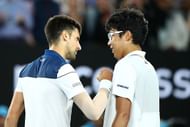
I first noticed Hyeon Chung when I astonishingly watched him take Rafael Nadal to a tie-break at the Barcelona Open last year. I was pretty shocked to see a newbie take the King of Clay to a tie-break on clay.
I hadn't read about him before the NextGen ATP Finals and had made up my mind beforehand that either Denis Shapovalov or Andrey Rublev would win the tournament. Therefore it was a shocker for me when Chung had won the NextGen ATP Finals, defeating Andrey Rublev in the finals. He also didn’t lose a match throughout the tournament.
This year though, he sent shockwaves through the entire tennis world when he shockingly defeated 6-time champion Novak Djokovic in the 4th round of the Australian Open. He reached the semi-finals of the tournament, where he had to withdraw mid-match due to foot blisters when he was about to go two sets to love down against Roger Federer. During the tournament, he became the first South Korean, male or female, to ever advance beyond the fourth round of a Grand Slam.
As far as consistency is concerned, he has reached the quarterfinals or better in his last 6 tournaments. Due to this consistency, he has also made his debut in the Top 20 of ATP.
He has a great backhand and return game, but his lacklustre serve might prove to be an obstacle which he would like to definitely improve in the near future.
He has also been compared with Novak Djokovic on more than one occasion. It’s just a matter of time when we will get to know if he can replicate Djokovic’s incredible success as well.
2) Frances Tiafoe (USA)
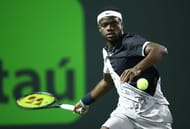
I first got to know about Frances Tiafoe when I watched his first-round match against Roger Federer at the Miami Masters last year. He eventually lost the match but won my attention.
Tiafoe’s success as a teenager led many to believe that he will become the torch bearer for American Tennis in the future. As a teenager, he won the US Junior National Championship. He has also enjoyed success on the ATP Challenger Tour, with 9 finals and 4 titles. He made his debut in the ATP Top 100 in 2016 and is now at a career-high ranking of 58.
Tiafoe recorded his first top 10 wins at the Cincinnati Masters in August, over the world no.7 Alexander Zverev. In the US Open, he almost won against Roger Federer in the first round, eventually losing the 5-set marathon. He was also picked by John McEnroe to replace Juan Martin Del Potro in Team World in the inaugural Laver Cup, which mostly featured players from the ATP Top 25.
This year, he won his first ATP Title at the Delray Beach Open, defeating his idol and world no.10 Juan Martin Del Potro, and also fellow NextGen players Denis Shapovalov and Hyeon Chung.
Tiafoe has an aggressive offensive game that relies on a big serve and powerful forehand. He is capable of serving at speeds over 140 mph which makes him a very dangerous player. He needs to improve his return game and volley skills though, to be effective against the big guns of the sport.
Therefore, be on the lookout for him in the future, if you are already not right now.
3) Denis Shapovalov (Canada)
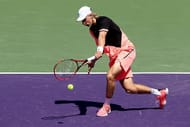
I must admit that my first impression of Shapovalov was a pretty negative one, as I stumbled on a video of Shapovalov unintentionally hitting the chair umpire in Canada’s tie against Great Britain in the Davis Cup in rage. That was in February and I didn’t hear of him before August when he defeated Juan Martin Del Potro and then Rafael Nadal in the successive round at the Rogers Cup. He lost to eventual champion Alexander Zverev in the semifinals, becoming the youngest player to reach the semifinals in a Masters 1000 tournament.
He then became the youngest after Michael Chang in 1989 to reach the fourth round of the US Open, defeating the 8th seed Jo-Wilfred Tsonga on the way. He was also picked by team captain John McEnroe to represent Team World in the inaugural Laver Cup held later in September, which was to take on Team Europe that consisted of Roger Federer and Rafael Nadal among others and was captained by Bjorn Borg.
He also qualified for the inaugural NextGen ATP Finals but wasn’t able to qualify for the semi-finals of the same.
Shapovalov has a very offensive game style, with the forehand and the serve his biggest weapons. His backhand tends to misfire at the time due to his ultra-aggressive game style. There is also a room for improvement in his volleys and returns, which will aid him in implementing his game style effectively.
It will be very interesting to see the progress he makes this year, where he has already reached the semi-finals of the Delray Beach Open. He also has time on his side, as at 18 years of age, he is the youngest player in the ATP Top 100.
4) Andrey Rublev (Russia)
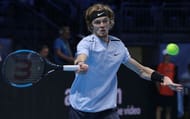
I first noticed Rublev during the US Open last year. World No.9 Grigor Dimitrov had been knocked out in the second round of the US Open by a Russian teenager, which immediately caught my attention. I thought it was just a lucky win and he would lose in the next round. But he went till the quarter-finals where he lost to eventual champion Rafael Nadal.
I eventually did some research and found out that he had won the junior championship at the French Open in 2014. In July of 2017, he had become just the seventh player to have won a tournament as a lucky loser. He had lost in the qualification rounds but eventually reached the final, beating the defending champion Fabio Fognini in the quarter-finals. He then beat Paulo Lorenzi to win his first ATP Title.
He also reached the NextGen ATP Finals, defeating Denis Shapovalov and Borna Coric on the way. He then lost to Hyeon Chung in the finals.
Andrey Rublev’s game has been often compared with that of a boxer - a quick combination of points. When Rublev defeated David Goffin in the fourth round at the US Open last year, Goffin said: “It was tough for me, because he was playing really fast, left and right.”
Left, right, left, right. Like a boxer.
It’s not hard to know where that mindset comes from though. His father was a professional boxer.
He has a great forehand and a great serve. Rublev can hit 130 mph serves, etc. but is very prone to run out of energy on serve. Once, his serve velocity really dropped the next day after a long match. He also has a sort of ping-pong game, playing mostly from the back of the court and unable to finish the point at the front.
Predicting the future is pretty dangerous but I have pretty high expectations from Rublev that he will definitely be a top-10 player in the future.
5) Alexander Zverev (Germany)
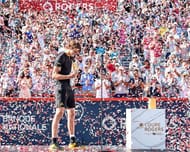
Alexander Zverev, for me, has been one of the most promising young talents on the tour for a while. Last year turned out to be a breakthrough season for him.
He won 5 titles, which included his first two Masters titles. He won his first Masters' title at the Rome Masters by defeating Novak Djokovic in the final. In his second Masters final, he defeated Roger Federer in the final. He was performing at such a high level that he was deemed as one of the favourites to win the title at the US Open.
Despite his rather lukewarm performances at the Grand Slam level (he has never gone past the 4th round), he finished the year at a career-high ranking of World No.4.
He qualified for both the NextGen ATP Finals and also the ATP World Tour Finals, deciding to compete at the senior-level World Tour Finals. He lost in the group stage.
He possesses a great serve and an excellent double-hander backhand. His game is a very aggressive one, and his shots are full of power. He is also known for his persistence and work-ethic. He many a time manages to find his fizzing first serve during crunch moments, which has become one of his biggest strengths. But his inability to have a plan B might not pose a problem in general, but against the big guns, that may not always work.
Possessing the maturity that he possesses, if he somehow just manages to find his consistency, one could definitely say that great things lay ahead for this young German. And who knows, one day he may even eclipse his nation’s hero, Boris Becker.
